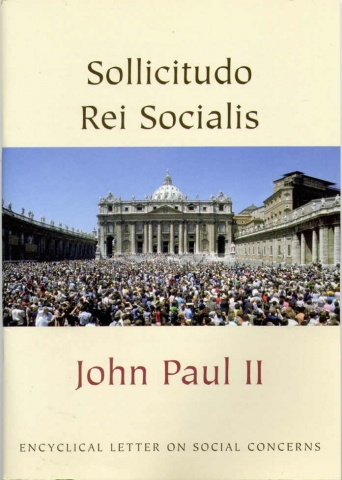
Description: Sollicitudo Rei Socialis ( On Social Concern)
Image copyright: http://www.lourdes-books.com/sollicitudo-rei-socialis-155/12.html
Sollicitudo Rei Socialis is an encyclical written by Pope John Paul II on 30 December 1987. Sollicitudo Rei Socialis was written in regard to 'Social Concern' for the 20th anniversary of 'Populorum Progressio'.
About the Author
The new encyclical Sollicitudo rei socialis, which can be broadly translated as "The concern (of the Church) for the Social Order" was designed by its author, Pope John Paul II, to mark the twentieth anniversary of the encyclical Populorum Progressio. The latter was published slightly more than a year before the even more famous encyclical Humanae Vitae. The year between the publication of these two encyclicals might be regarded as the last of the relative Indian Summer which followed the close of the Second Vatican Council in 1965. The publication of Humanae Vitae marked the end of the calm before the storm.
John Paul lI's latest encyclical has received less public attention than might have been expected, although in the United States, in particular, some aspects of its analysis have been subject to criticism, which has come particularly, although not exclusively, from liberal "free marketeers".
Brief Summary
Sollicitudo Rei Socialis seeks to joyfully proclaim moderate, left of center, and nonpartisan social and political principles from the perspective of Catholic social thought, especially as defined by the pastoral constitution Gaudium et Spes and by the Holy Spirit speaking to us through tradition, scripture, and the sense of the faithful. Sollicitudo Rei Socialis is a proud member of the Reality-Based Community.
Important Teachings/Decisions
1. The Dignity of the Human Person
Human beings are created in the image of God and, therefore, are endowed with dignity. This inherent dignity carries with it certain basic rights and responsibilities which are exercised within a social framework.
2. The Common Good
While the dignity of the human person is affirmed, individuals live in common with others and the rights of individuals must be balanced with the wider common good of all. The rights and needs of others must be always respected.
3. Solidarity
Human beings are social by nature and do not exist merely as individuals. When considering the human community it must be remembered that it consists of individual and social elements.
4. Subsidiarity
This principle recognises that society is based on organisations or communities of people ranging from small groups or families right through to national and international institutions. As a rule of social organisation, subsidiarity affirms the right of individuals and social groups to make their own decisions and accomplish what they can by their own initiative and industry. A higher level community should not interfere in the life of a community at a lower level of social organisation unless it is to support and enable.
5. The Purpose of the Social Order
The social order must uphold the dignity of the human person.
6. The Purpose of Government
The purpose of government is the promotion of the common good. Governments are required to actively participate in society to promote and ensure social justice and equity.
7. Participation
Individuals and groups must be enabled to participate in society.
8. The Universal Purpose of Goods
The world's goods are meant for all. Although the Church upholds the right to private property this is subordinate to the right to common use and the overall common good. There is a social mortgage on private property.
9. The Option for the Poor
This refers to seeing the world through the eyes of the poor and standing with the poor in solidarity. This should lead to action for justice with and on behalf of those who are poor and marginalised.
10. The Care of Creation
The Earth is God's gift and all species have a rightful place in it. Humans share this habitat with other kind and have a special duty to be stewards and trustees of the Earth.
Bibliography
http://www.vatican.va/holy_father/john_paul_ii/encyclicals/documents/hf_jp-ii_enc_30121987_sollicitudo-rei-socialis_en.html
http://sao.clriq.org.au/cst/cst_intro.html
http://www.ad2000.com.au/articles/1988/may1988p4_556.html
